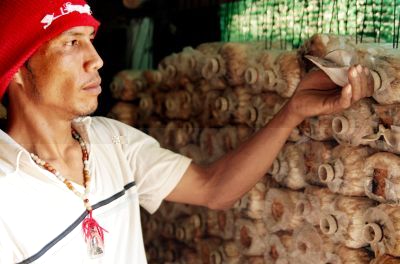Thai poachers turn funghi farmers in bid to save forests

Your support helps us to tell the story
From reproductive rights to climate change to Big Tech, The Independent is on the ground when the story is developing. Whether it's investigating the financials of Elon Musk's pro-Trump PAC or producing our latest documentary, 'The A Word', which shines a light on the American women fighting for reproductive rights, we know how important it is to parse out the facts from the messaging.
At such a critical moment in US history, we need reporters on the ground. Your donation allows us to keep sending journalists to speak to both sides of the story.
The Independent is trusted by Americans across the entire political spectrum. And unlike many other quality news outlets, we choose not to lock Americans out of our reporting and analysis with paywalls. We believe quality journalism should be available to everyone, paid for by those who can afford it.
Your support makes all the difference.Nuan Muangchan began to illegally log rosewood as a teenager, creeping at night into Thailand's largest national park and hiding from animals and rangers to smuggle out her loot.
"One time I jumped off a cliff to escape the authorities," the 43-year-old recalled, rolling up her sleeve to display her marked limbs. "I still have the scars on my arms and legs."
Thailand's lush jungles are under daily attack by illegal loggers and poachers, but conservationists in the country's northeast are turning to an unlikely remedy - the common mushroom.
A project that turns former wildlife criminals into funghi farmers is proving a surprising success, giving villagers a decent wage while helping to slow the destruction of forests in the Khao Yai National Park, a World Heritage Site.
Under the scheme, set up by Thailand's Freeland foundation, Nuan now has her own business as a mushroom farmer and no longer relies on precious rosewood, prized for its perfumed sap, as her only means of regular income.
And she has persuaded her 33-year-old nephew Boonrod to join her in abandoning the illegal work.
Boonrod said he earns 300 dollars a month from his mushroom farm - a relatively good income in this impoverished rural belt, and enough he said to stop logging.
"Once I started my own business growing mushrooms I started to get a steady income," said Boonrod. "I love the forest, I want to protect it. I feel sorry for what I did in the past."
Education levels are low in the northeastern region of Isan and most villagers are landless, with many relying on daily hire for farm or construction work to provide for their families.
As well as giving potential mushroom farmers all the start-up tools they need, the Freeland foundation also trains up park rangers, who arrest an average of two poachers or loggers every week.
But they said that prosecution alone has not been effective in reducing wildlife crime.
"We have to use two strategies: push and pull. The rangers push the poachers out of the forest but we need to pull the villagers into an alternative occupation and convince them to change," said Mukda Thongnaitham from Freeland.
The group estimates there are more than 500 poachers and loggers at work every day in the exotic wilderness of Khao Yai, home to 800 species of animals including reindeer, gibbons, sambar deer, and bison. Even tigers are rumoured to still roam the forests.
But all of the animals are vulnerable to poaching, with parts of bears ending up in places as far away as Japan and South Korea, where customers prize them for their use in traditional Asian medicine, and deer and wild boar meat fetching high prices as a delicacy at local markets.
In its efforts to reduce these illegal activities, the Freeland project consulted villagers on their skills and surveyed the local market to see what would sell, before plumping for mushrooms as an alternative income source.
The funghi are grown in bags filled with sawdust, gypsum, lime, rice bran and magnesia sulphate, and cooked in an oven to keep out germs.
The farmers take their pasteurised formula, add mushroom spores, and leave them to grow in nursery barns at home, where the first harvest is ready within a month.
The organic oyster mushrooms are sold at the local market and have proved so popular that the farmers cannot grow enough.
"At this stage we still cannot meet the market demand so we need to expand this project to other villages," said Mukda, who hopes to begin growing yanagi or straw mushrooms, and shiitake, which can fetch a higher price.
The produce is only sold at the local bazaar for now, but in future it is hoped the mushrooms will be distributed to bigger markets.
"If we make it here we can create more work and generate more income in the community," said Mukda.
Nuan is busy building new barns to expand her funghi farm and said the work has given her a new sense of worth.
"When I see the green of the forest and the white and black of the mushrooms I feel proud," she said. "I'm happy we no longer destroy nature, we are pure."
Join our commenting forum
Join thought-provoking conversations, follow other Independent readers and see their replies
Comments